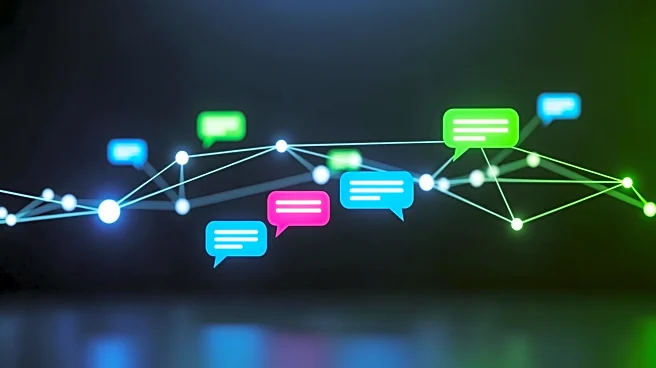What's Happening?
OpenAI has launched a pilot program for group conversations within ChatGPT, available in Japan, New Zealand, South Korea, and Taiwan. This new feature allows users to create group chats with friends and family,
with ChatGPT participating to assist in planning activities, generating ideas, and facilitating collaboration. Users can start a group chat by tapping a people icon, inviting up to 20 participants who must set up profiles. The feature is powered by GPT-5.1 Auto, which adapts responses based on the conversation flow, ensuring ChatGPT contributes appropriately.
Why It's Important?
The introduction of group conversations in ChatGPT represents a significant advancement in AI's role in social and collaborative settings. By enabling group interactions, OpenAI is expanding the utility of ChatGPT beyond individual use, potentially transforming how people plan, collaborate, and communicate. This development could enhance productivity in educational and professional environments, offering a new tool for teamwork and project management. It also reflects the growing integration of AI into everyday social interactions, raising questions about privacy and the ethical use of AI in group settings.
What's Next?
OpenAI plans to refine the group conversation feature based on user feedback before a broader rollout. As the feature gains traction, it may lead to increased adoption of AI-driven communication tools in various sectors, including education and business. Stakeholders may explore further applications of AI in collaborative environments, potentially leading to new innovations in AI-assisted teamwork. Additionally, OpenAI's approach to managing sensitive content in group chats could influence industry standards for AI moderation and user safety.
Beyond the Headlines
The expansion of ChatGPT's capabilities into group settings may prompt discussions about the role of AI in social dynamics and its impact on human interaction. As AI becomes more integrated into group communications, it could alter traditional social structures and communication patterns, leading to new cultural norms. This development also raises ethical considerations regarding AI's influence on group decision-making and the potential for AI to shape collective opinions.









